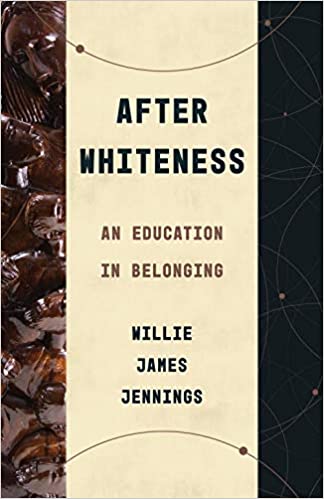Sarum College Principal James Woodward reviews this title by Willie James Jennings (Eerdmans 2020) and reflects on these ideas in the context of Sarum.
This short book is uncomfortable and inspiring in equal measure. It exposes to this reader the staleness of much of UK theological education as lacking vision, independence, originality, and inclusion.
Five carefully woven chapters combine poetry, memoir, analysis, and Gospel to push constantly at boundaries as distortions are exposed. This is a theological critique of the presumptions of theological education.
Jennings pushes back on the questions that drive the way institutions are organized, on what it means to be a theological educator, and the motives and aspirations that lie of the heart of education.
The US contexts within which this text has emerged are worth noting – Duke Divinity School and presently Yale University Divinity School. They are prestigious, endowed, and wealthy institutions. As an academic and an academic administrator, Jennings understands education, power, the student experience and what he describes as the ‘arrogance of orthodoxy’. It is grounded with the community of faith. He makes a plea for a Gospel that in Christ creates a new belonging that offers human flourishing and wholeness. He argues that Western theological education creates a mode of theologian: the educated man, master of the plantation, dispassionate classifier of all lesser beings.
So, what is Whiteness for Jennings? Is not an ontological category – it is an optic, a way of seeing ourselves and others that justifies ripping off people’s land on one continent and forcing upon labour and sex and death upon those people on another. Part of its success is its hiddenness in plain sight. Once Whiteness is seen and named, it draws the most vehement protests. A new belonging is possible after Whiteness. For Jennings, it is born in an intimacy with Jesus, who shows us that our desire for him also means we desire good for one another.
Jennings believes in theological education and its power to transform. While the content of education is important the purpose of theology is belonging. Communion with Christ and with one another. Jennings call for the exodus of theological education from the loneliness of individualistic self-sufficiency into a joyful, overflowing experience of communion. He calls his reader to capture its central purpose – to form us in the art of cultivating belonging (p10).
For Jennings, what prevents us from nurturing belonging is ‘white self-sufficient masculinity,’ which he defines as:
‘a way of organizing life with ideas and forming a persona that distorts identity and strangles the possibilities of a dense life together. In this regard, my use of the term “whiteness” does not refer to people of European descent but to a way of being in the world and seeing the world that forms cognitive and affective structures able to seduce people into its habitation and its meaning making.’
Jennings utilises storytelling. Through his stories, we glimpse the complicated, difficult work theological educators do. This work is complex and messy. In an era of racial unrest, pandemic, and ongoing ecclesial crises, Jennings asks his reader: how can we not notice the crumbling of what has been? The longer we resist or deny the crumbling, the harder it will be to discover what is being built. In our situation, the reader is asked to see the world and what is happening in it and to allow the pressure and discomfort of the present reveal the problems of our past. How have our churches been inadequately organised to respond faithfully to the issues now facing us?
Jennings writes, ‘The shared work of discerning the overturning in the midst of the building is by far one of the most difficult tasks for theological institutions.’
Here are the questions that Jennings has shaped for this reviewer:
- If the main issue troubling theological education is the idealisation of self-sufficient white masculinity and how its virtues of possession, control, and mastery are intricately woven in the practices and values of institutions – and we had the opportunity to start over again with Sarum – what would that look like for us?
- If, as Jennings suggests, that in the USA theology (and the Church) are in decline how would you tackle expressing your passion and vision theology? What makes your theological heart soar? What kind of theology are we being called into nurturing? What would creating a new paradigm for theological education look like over the next three years?
- Jennings’ writing and teaching centres on storytelling. What is story’s role in theological education and why is it important to incorporate that kind of thinking? What is our story? What brings us to life? How do we hold thinking and feeling together? What do we do well at Sarum? What is the story of Sarum?
- In After Whiteness, Jennings touches on the three different areas that constitute the Western education ecology: the lives of students, the lives of faculty, and the lives of administrators. The idea of educating toward belonging and community is a key element of his vision. How are we to understand this in the light of the culture of HE in the UK today? What is our ideal as a scholar? Where would any of us like to be in our professional development in (say) three years’ time? What might it mean to mature intellectually? What might we need to get there!
- What do we want to show our students? What do we want them to see?
- What kind of space are we building? What are the gifts and achievements of Sarum? What might need nurturing and cherishing? Jennings makes a case for the nurture of inwardness and contemplation – how do we build upon our gifts?
Read James’s other reviews on his blog here

Leave a Reply